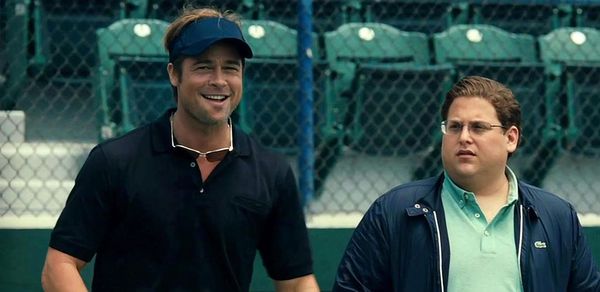Eye For Film >> Movies >> Moneyball (2011) Film Review
Moneyball
Reviewed by: Robert Munro

Sports movies are notoriously difficult to pull off. Too much sport and you alienate the majority of your audience. Too little and you don’t have a film about much of anything. Moneyball ends up landing somewhere in between those two, but doesn’t do a whole lot more than that.
Billy Beane (Brad Pitt) is managing director of Oakland Athletics. We’re told through a series of flashbacks that we could have done without that Beane was a supremely talented baseball player as a kid but things just didn’t work out for him as a player. He’s now doing a miracle job at the A’s, enabling them to compete with teams like the New York Yankees, despite working on a fraction of the budget.

At the beginning of the film we see, through a nicely edited sequence of television footage, Oakland lose to the Yankees at the end of the season, meaning they miss out on the World Series game. They then lose their three best players and, without the finances to replace them, Beane becomes frustrated about their prospects. The film is set-up in such a way to make sure we understand we’re in underdog sports movie territory.
All the sports-movie clichés are here. Beane begins the film soul-searching in an empty stadium – the only other person in the joint is the security guard. He needs to rebuild the team on a shoestring and can’t figure out how to do it - his crack team of slovenly scouts are no help either, announcing player X has the looks required or player Y’s girlfriend is too ugly, meaning he has no confidence. This is where Peter Brand (Jonah Hill) comes in. An economics graduate from Yale with a head for numbers, he breaks the game down into reams of statistics that can be used to unearth players that other teams would willingly throw on the scrap-heap.
This throws the plucky-underdog narrative into over-drive. Beane is the angry, failed single man fighting the whole of baseball to get his system to work. He jogs alone with his hood up (tick off another cliché) and throws things around a lot. He’s occasionally a hard character to sympathise with, but is given a daughter relationship to nurture which rounds him out a little. With Brand’s system in tow and coach Art Howe (excellently underplayed by Phillip Seymour-Hoffman) being undermined as players are sold from beneath him to ensure he plays the new statistically optimum recruits, the team turn around their miserable season and start to win. And then win some more.
Cue another cliché. We see the team win 20 games on the bounce in the kind of montage which would have seen Rocky bludgeon opponents into the canvas in preparation for ‘The Big Fight’. While the film does rattle through these pillars of the underdog sports movie narrative, it does so with an element of class, a helping of humour and a knowing wink. This is never more evident than in the ‘dressing-room-inspiration-scene’ in which Beane delivers a short and simple speech without any of the hyperbole the scene would normally demand.
It’s also evident in the ‘sport-on-the-pitch-as-metaphor-for-real-life-scene’. This comes after the A’s lose a vital game and Beane believes he has failed. Pete shows footage of a guy so used to being hopeless at batting that he swings, connects, runs to first base, falls over, scrambles back up to make first base before being made aware that he’d actually hit a home run. He was so used to failing, that he hadn’t bothered to look up and see the ball sail into the crowd. After playing the clip, Pete deadpans: "It’s a metaphor", to which Pitt replies with one of his trademark smirks: "I know it’s a metaphor".
There are more than a few laughs to be had from a script with West Wing and Social Network writer Aaron Sorkin’s involvement, although the rapid-zinger talk of his previous work is largely absent here.
There’s also a lot to be said for the look and feel of the film, which undoubtedly owes a lot to the excellent Friday Night Lights television series and, to a lesser extent, film. Like that show, many of the films’ scenes are allowed to play out with hand-held, close-up camera work, giving a fluidity to proceedings that is well suited to a film about sports. Like the television show, these well choreographed scenes are often accompanied by a softly lilting electric guitar, lending a rather wistful mood. No one who has seen Friday Night Lights will be able to watch Brad Pitt driving in his truck with his shades on, and a sports phone-in on the radio, without being reminded of Kyle Chandler's Coach Taylor.
Pitt does pretty well in the role of Beane, managing to create a driven individual who masks his insecurities with a quick smile and a macho stance. However, it does feel that he glides through this role, much in the way his character seems to glide through the season with the A’s, offering us very little real depth of understanding to come away with about Billy Beane. But maybe that’s the point. Both Hill and Seymour-Hoffman are quietly brilliant in supporting roles in which you would not normally expect to find them.
But despite all the good things to be found in Moneyball, there’s still something about it that leaves you feeling a little cold. You never really feel like you care whether or not the team wins. Maybe it’s because the narrative is shifted away from the players and the coach to the backroom staff or maybe it’s because the characters aren’t given enough real meat to make you feel for them. It felt a little similar to Up In The Air in that regard: a high concept, star-driven film with more than a few laughs, but with no really believable human characters to hang your hat on. Beane’s daughter-relationship story-line feels a little tacked on, as if late in the process the writers realised that the lack of much human connection might be a problem. They were right.
Reviewed on: 25 Nov 2011


















